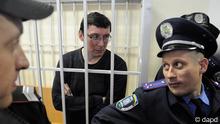• Topics / Politics and human rights
• Topics / The right to a fair trial
European Court hearing in Lutsenko case

On 17 April 2012 the European Court of Human Rights held a public chamber hearing in the case of Lutsenko v. Ukraine. The case concerns former Interior Minister Yury Lutsenko’s “complaint that his arrest and the decision on his detention were arbitrary and unlawful, and that he was not informed about the reasons for his arrest.”
The chamber hearing can be heard here:
http://echr.coe.int/ECHR/EN/Header/Press/Multimedia/Webcasts+of+public+hearings/webcastEN_media?id=20120417-1&lang=en&flow=high
The Court informs that following the hearing, it “will begin its deliberations, which will be held in private. Its ruling in the case will, however, be made at a later stage.
In comments to the Deutsche Welle Ukrainian Service, Mr Lutsenko’s lawyer Valentina Telychenko and Head of the Ukrainian Helsinki Human Rights Union Board, Yevhen Zakharov, both saw the impact of a judgement in Yury Lutsenko’s favour lying in its moral significance.
Valentina Telychenko: “If the European Court finds political motives in Lutsenko’s being held in detention, that will firstly be something new in European Court case law, and secondly it will mean that it is hard to doubt the presence of political motives in Lutsenko’s whole prosecution. Taking that into account, one can also analyze the cases of other members of the opposition”.
If the ECHR judgement were to come into force before the appeal was heard, there would be a chance that the former Interior Minister could be released until the appeal. This, however, Yevhen Zakharov says seems improbable since the judgement would still need 3 months before coming into effect.
Valentina Telychenko stresses that other applications will follow. One, in fact, complaining of failure to provide medical assistance has already been lodged with the court. She mentions that last week the results of medical examinations were revealed. These showed that in September 2011 a blood test found viral hepatitis in Lutsenko’s blood, yet neither he nor his relatives were informed.
While also part of a separate application, Ms Telychenko has included this in the arguments presented on Tuesday for Yury Lutsenko’s release from detention.
The following is from the information on the Court’s website.
The applicant, Yuriy Vitaliyovych Lutsenko, is a Ukrainian national who was born in 1964 and is detained in Kyiv. He is a former Minister of the Interior and the leader of the opposition party Narodna Samooborona. In November 2010 the General Prosecutor’s Office brought criminal proceedings against Mr Lutsenko for unlawfully arranging different work-related benefits for his driver. On 11 December the same year, the prosecution brought another criminal case against Mr Lutsenko for abuse of office, for allegedly arranging the allocation of a one-room apartment to his driver. The two criminal cases were joined. On 13 December 2010 the prosecutor completed the investigation, formally indicted Mr Lutsenko and invited him to study the case file, which he did on several occasions between 15 and 23 December 2010.
Mr Lutsenko was arrested on 26 December 2010 near his home by officers of the Security Service and the investigator of the General Prosecutor’s Office in connection with another criminal case brought against him on 24 December 2010. According to him, he was not informed of the reasons for his arrest and was not given a copy of the charges against him. On 27 December 2010 Mr Lutsenko and his lawyer attended a hearing before the Pechersky court, which they had only found out about 20 minutes before it started. The hearing concerned the prosecutor’s request to keep Mr Lutsenko in detention pending his trial. According to Mr Lutsenko, he only discovered what the hearing was about after the hearing had started. The court allowed the prosecutor’s request, accepting their reasoning which included the arguments that the applicant and his lawyer had studied the case file slowly and had given information about it to the media. The court further found that Mr Lutsenko had tried to prevent the investigation and was capable of influencing it, and had not admitted his guilt. Mr Lutsenko’s lawyer appealed unsuccessfully. Mr Lutsenko remains in detention. He was convicted on 27 February 2012.
Procedure
The application was lodged with the European Court of Human Rights on 21 January 2011. Relying on Article 5 §§ 1 (b) and (c), 2 and 3 (right to liberty and security) of the
Convention, Mr Lutsenko complains in particular that his arrest and detention were
arbitrary and unlawful, and that he was not informed about the reasons for his arrest
Relying also on Article 6 §§ 1, 2 and 3 (a) and (b) (right to a fair trial), he complains that
he was not informed in advance about the subject of the court hearing of 27 December
2010.
The Court communicated the application to the Ukrainian Government in April 2011. It
asked the Government to reply to a number of questions, including whether Mr Lutsenko had been detained for a purpose other than those envisaged in Article 5, contrary to Article 18 of the Convention, given his active participation in political life in Ukraine and his opposition to the Government.
Representatives of the parties
Government
V. Lutkovska, Agent,
N. Kulchytskyy, Counsel
M. Bem, Adviser
I. Zinchenko, Adviser
D. Loban, Adviser
Applicant
I.Y. Fomin, Counsel
V. Telychenko, Counsel
T. Tsiukalo, Adviser





